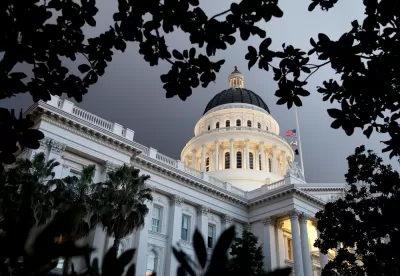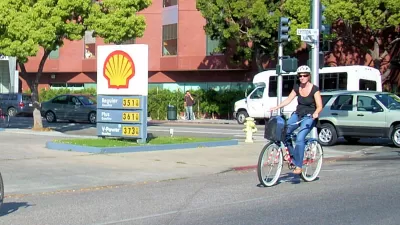On April 6, the Senate and Assembly passed a comprehensive transportation funding package that it had been unable to do for years, thanks to much deal-making by Gov. Jerry Brown. The gas tax will increase by 12 cents per gallon on November 1.

In addition, diesel excise taxes increase by 20 cents per gallon, also on November 1, as does the diesel sales and use surtax by four percent. On January 1, 2018, a new, variable transportation improvement fee between $25 and $175 based on vehicle value takes effect. The new registration fee and fuel excise taxes are indexed for inflation.
Finally, model year 2020 and newer zero emission vehicles (battery electric vehicles without gas tanks and fuel cell electric vehicles) will be charged an annual $100 road improvement fee (tag: EV Fees), also with an inflation adjustment.
The bill passed the Senate, then the Assembly on Thursday night, with the bare minimum needed to meet the two-thirds supermajority requirement. The last time the legislature passed a tax increase was 1989, 28 years ago, and that nine cents per gallon increase, without an inflation adjustment, was sent to the voters for approval in 1990.
The bill, SB 1 by Sen. Jim Beall (D-San Jose), dates back to December 2014, when it's predecessor, SB 16, also by Beall, was introduced.
“My thanks and appreciation go to Governor Brown, the Legislature’s leadership for their support of SB 1, and the lawmakers who voted for the bill," stated Beall in a press release. "They took a courageous stand today that said they will not tolerate the status quo. They voted to get our crumbling roads repaired and made safer. They voted to make California better. With $5 billion [annually] in new revenue, the state can quickly begin work on shovel-ready road repairs."
With one notable exception, he could have simply limited his thanks to the Democratic members of the legislature and the voters who elected them, as the Republicans, save one Central Valley senator, were opposed from the onset and wouldn't budge. Their solution to the $130-billion backlog of repairs to state highways and bridges and local streets: drain the money from the state's general fund.
The exception, and the notable role played by commuter rail
As noted on April 3, tax increases of any kind are difficult to pass in California because the constitution requires the legislature to pass such bills by a supermajority. The Golden State is not alone in this respect. The Center on Budget and Policy Priorities indicates that 16 states have such a restriction, but only "Arizona, California, Nevada, and Louisiana require a two-thirds vote of each house."
California Republicans are not like Republicans in other states that have shown willingness to raise fuel taxes for transportation programs [Tag: State Gas Tax increase, starting with Wyoming's ten-cent increase in 2013].
Among the 11 state legislatures that passed gas tax increases that were signed into law in 2015 (see list in "Wouldn't It be Nice if Legislators Were Rewarded for Voting to Increase the Gas Tax?"), six had Republican trifectas (legislature and governor of the same party). In a seventh, Nebraska, also a Republican trifecta, the legislature overrode Gov. Pete Ricketts' veto to approve the six cents increase.
Of the remaining four states, there were no trifectas: two had Democratic governors; one Independent governor, and one Republican governor. In other words, Republican-controlled states were far more likely to pass gas tax increases than any other political combination in 2015.
While California Democrats attained a supermajority in both the Assembly and Senate after the November election, when it comes to gas tax increases, party affiliation is no guarantee of support. Case in point: Sen. Steve Glazer (D-Orinda, Contra Costa County).
"He once campaigned against BART strikes and now he reportedly wants to add a strike ban to Senate Bill 1, something Brown has called a 'nonstarter,'" reports Patrick May for The Mercury News.
Without Glazer, Democrats held 26 votes, one short of a two-thirds supermajority, which brings us to Sen. Anthony Cannella, "a Republican from Ceres [Stanislaus County] in the Central Valley [who] had said previously that he would support the package if the state supported the extension of the Altamont Corridor Express to Ceres and Merced and a $100 million parkway project between the UC Merced campus and Highway 99," reported Katy Murphy for The Mercury News. [See 22 second video].
Of course, it helps that Cannella will be termed-out at the end of 2018.
Gas tax standing with respect to other states
Four years ago, California had the highest state gas tax. But other state legislatures managed to raise their taxes, plus the Board of Equalization adjusted the tax downwards for three consecutive years per the notorious gas tax swap of 2010.
The state's gasoline excise tax is 27.8 cents per gallon (per Board of Equalization [pdf]). The total state tax amounts to 38.13 cents, according to the American Petroleum Institute [pdf[, as of Jan. 1, 2017, sixth highest behind:
- Pennsylvania: 58.20 cents
- Washington: 49.40 cents
- Hawaii: 44.39 cents
- New York 43.88 cents
- Connecticut 39.85 cents
One final note on the state's fluctuating gas tax. From now on, it will only be adjusted for inflation. The infamous and arcane annual "gas tax swap" adjustments by the Board of Equalization will be no longer.
History was made in the Golden State on April 6, 2017. All that's left is for the governor to sign the legislation that he so vigorously promoted.
Additional reading:
- KQED California Report: How They Made the Sausage: 3 Deals Key to Passage of Transportation Bill
-
Streetsblog California: Transportation Funding Bill Passes with Closed-Door Deals and Public Posturing
- Gov. Jerry Brown and State Democratic Leaders Agree on Gas Tax Deal, April 3, 2017: Revised transportation funding legislation is needed to meet California's ballooning infrastructure deficit, but it needs a supermajority to pass, and it contains a fatal flaw for clean air activists.
- Gas Tax Increases Have Their Limits, April 8, 2017: Even if [SB 1] should pass into law, the funding mechanism may not prove sustainable in the long term.
FULL STORY: California's Largest Increase in Fuel Taxes Approved by Legislature in One Day

Maui's Vacation Rental Debate Turns Ugly
Verbal attacks, misinformation campaigns and fistfights plague a high-stakes debate to convert thousands of vacation rentals into long-term housing.

Planetizen Federal Action Tracker
A weekly monitor of how Trump’s orders and actions are impacting planners and planning in America.

In Urban Planning, AI Prompting Could be the New Design Thinking
Creativity has long been key to great urban design. What if we see AI as our new creative partner?

King County Supportive Housing Program Offers Hope for Unhoused Residents
The county is taking a ‘Housing First’ approach that prioritizes getting people into housing, then offering wraparound supportive services.

Researchers Use AI to Get Clearer Picture of US Housing
Analysts are using artificial intelligence to supercharge their research by allowing them to comb through data faster. Though these AI tools can be error prone, they save time and housing researchers are optimistic about the future.

Making Shared Micromobility More Inclusive
Cities and shared mobility system operators can do more to include people with disabilities in planning and operations, per a new report.
Urban Design for Planners 1: Software Tools
This six-course series explores essential urban design concepts using open source software and equips planners with the tools they need to participate fully in the urban design process.
Planning for Universal Design
Learn the tools for implementing Universal Design in planning regulations.
planning NEXT
Appalachian Highlands Housing Partners
Mpact (founded as Rail~Volution)
City of Camden Redevelopment Agency
City of Astoria
City of Portland
City of Laramie




























